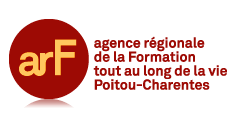 L'IRTS Poitou-Charentes, 1 rue G.Guynemer - BP 215 - 86000 POITIERS, organise, du 19 au 21 mars à Poitiers, un colloque sur le thème du Travail social et de l'économie sociale et solidaire.
L'IRTS Poitou-Charentes, 1 rue G.Guynemer - BP 215 - 86000 POITIERS, organise, du 19 au 21 mars à Poitiers, un colloque sur le thème du Travail social et de l'économie sociale et solidaire.
Au programme notamment des conférences sur le travail social ou les compétences de l'économie sociale et solidaire; des ateliers sur la place de l'économie sociale et solidaire dans les formations, les enjeux de l'insertion par l'activité économique ou encore l'entreprenariat social; des tables rondes et des forums.
Consulter le programme du colloque.
19 MARS 2013
14h15 - 15h30 - Conférence « Travail social et économie solidaire vers un dialogue » - Jean-Louis Laville, CNAM, LISE-CNRS.
15h45 - 17h00 - Conférence « Les compétences de l’économie sociale et solidaire » - Patrice Braconnier, Vice-Président de l’Université de Poitiers
20 MARS 2013
9h00 - 10h30 - Conférence « Travail Social, Économie sociale et Europe » - Gerhard Mélinz, Professeur d’histoire sociale, FH Campus Wien Autriche - Nathalie Martin Papineau, Université de Poitiers
11h00 - 12h30 - Ateliers Cycle 1
1er Atelier: La place de l’économie sociale et solidaire dans les formations. Patrice Braconnier , Université de Poitiers, Maxime Chaffotte, Formateur IRTS PACA, et un étudiant.
2ème Atelier: Coopération internationnale et économie solidaire. Stéphane Laurent, Directeur du CIDAG ONG (Portugal), Magali Zimmer, Doctorante du CNAM et Jean-Christophe Pauget, Association Avenir en héritage.
14h00 - 15h30 - Ateliers Cycle 2
1er Atelier: Le Travail Social et l’entreprenariat social. Eva Fuchsbucher, Docteur en économie Université FH Campus Vienne (Autriche), Jérôme Laedearach, Directeur général de la fondation ensemble (Suisse) et Thierry Lècques, Association Navicule Bleue.
2ème Atelier: L’articulation entre bénévoles, volontaires et professionnels. Stéphane Rullac, Éducateur spécialisé, Docteur en Anthropologie, CERA-BUC Ressources, Julien Vignet, ATER Université de Caen Basse-Normandie et acteur associatif local.
15h30 - 17h00 - Ateliers Cycle 3
1er Atelier: Les enjeux de l’insertion par l’activité économique. Mélanie Peneau et Laure Servant, Sociologues consultantes, John Lasserre, Directeur entreprise insertion en Pays Royannais et Christophe Dunand, Directeur général de Réalise (Suisse).
2ème Atelier: Le Territoire et l’économie solidaire. Patrice Combettes et Olivier Patout, Association AVEM du Larzac, James Renaud, Conseil développement Poitiers et un représentant du Crédit Coopératif.
17h00 - 19h00 Rencontre Auteurs-Lecteurs « Les enjeux hybrides de l’économie sociale et solidaire. De la reconnaissance d’un tiers secteur » (Hors série 5 - Revue «Le Sociographe»)
21 MARS 2013
9h00 - 10h15 - Forum « Modèles d’action bénévole et gouvernance en économie sociale » - Gilles Caire, Université de Poitiers
10h30 - 12h00 - Forum « Politiques publiques, militantisme et solidarité » - José Bové, Député Européen
14h00 - 17h00 - Table ronde « Les perspectives du travail social et de l’ESS» Introduction par Stéphane Laurent, Directeur du CIDAC ONG (Portugal).
Échanges - débats: Daniel Arsicot, Président de la CRES Poitou-Charentes, Jean-Marc Borello, Président du groupe SOS, José Bové, Député Européen, Madeleine Hersent, Présidente de l’ADEL.
Clôture par Madame La Présidente de la Région Ségolène Royal.
 Tá an IRTS Poitou-Charentes, 1 rue G.Guynemer - BP 215-86000 Poitiers, eagraíonn ó 19-21 Márta i Poitiers, siompóisiam ar an téama na hOibre Sóisialta agus Eacnamaíochta Sóisialta. Cuimsíonn an clár léachtaí ar scileanna oibre sóisialta ar an ngeilleagar sóisialta; ceardlanna ar ról na heacnamaíochta sóisialta in oiliúint, ceisteanna comhtháthaithe trí ghníomhaíocht eacnamaíoch nó fhiontraíocht shóisialta, bhoird chruinne agus ar fóraim. Níos mó...
Tá an IRTS Poitou-Charentes, 1 rue G.Guynemer - BP 215-86000 Poitiers, eagraíonn ó 19-21 Márta i Poitiers, siompóisiam ar an téama na hOibre Sóisialta agus Eacnamaíochta Sóisialta. Cuimsíonn an clár léachtaí ar scileanna oibre sóisialta ar an ngeilleagar sóisialta; ceardlanna ar ról na heacnamaíochta sóisialta in oiliúint, ceisteanna comhtháthaithe trí ghníomhaíocht eacnamaíoch nó fhiontraíocht shóisialta, bhoird chruinne agus ar fóraim. Níos mó...
 © Kelformation - Séverine Dégallaix. Le stage de fin d’études, c’est l’entrée dans la cour des grands, le tremplin vers votre carrière. Il faut donc tenir compte des moindres détails pour que celui-ci corresponde entièrement à vos attentes. Nos conseils pour ne pas vous tromper dans votre choix.
© Kelformation - Séverine Dégallaix. Le stage de fin d’études, c’est l’entrée dans la cour des grands, le tremplin vers votre carrière. Il faut donc tenir compte des moindres détails pour que celui-ci corresponde entièrement à vos attentes. Nos conseils pour ne pas vous tromper dans votre choix. Tá céimeanna Intéirneachta © Kelformation. Severine Degallaix 's teacht isteach sa Sraith mór, an Springboard le do ghairm bheatha. Ní mór a chur san áireamh le haghaidh gach mion a fhreagraíonn go hiomlán do do riachtanais. Ní ár comhairle go mícheart i do rogha.
Tá céimeanna Intéirneachta © Kelformation. Severine Degallaix 's teacht isteach sa Sraith mór, an Springboard le do ghairm bheatha. Ní mór a chur san áireamh le haghaidh gach mion a fhreagraíonn go hiomlán do do riachtanais. Ní ár comhairle go mícheart i do rogha. 





/https%3A%2F%2Fprofilepics.canalblog.com%2Fprofilepics%2F1%2F0%2F1076071.jpg)